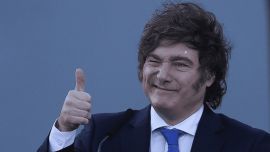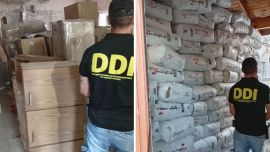The so called “corruption notebooks” scandal (‘Cuadernos de las coimas”) shocked Argentina into visualising the graphic nature of graft, bribes, and kickbacks that involved both the public and private sector, running throughout the Kirchnerite presidencies. It all began when a series of handwritten notebooks belonging to ex-Federal Ministry chauffeur Oscar Centeno were delivered to journalist Diego Cabot of the La Nación daily, who spent months analyzing them and later presented photocopies to prosecutor Carlos Stornelli, opening Pandora’s Box.
Cabot’s first story was published on August 1, the morning after a series of searches and arrests ordered by judge Claudio Bonadio, headlined by Roberto Baratta, the right-hand man to former planning minister Julio De Vido and the central node of the case. Centeno’s notebooks described Baratta’s every movement from 2004 to 2015, listing sums of money and locations that included some of the country’s most prominent businessmen, from President Macri’s cousin Ángelo Calcaterra to Techint CEO Paolo Rocca, and the highest spheres of power including the late Néstor Kirchner and his wife, Cristina Fernández de Kirchner.
The notebooks narrated how Baratta and others collected duffel bags filled with pesos and dollars from the so-called “public works club,” a group of companies dedicated to the construction of public works projects, in this case centered in the transportation sector. The funds were used to support the electoral campaigns of the Victory Front (FpV), including Cristina’s 2011 successful presidential re-election campaign, and to fill the pockets of those involved, according to the accusations.
Judge Bonadio has now ruled that the former president was the head of an illicit association along with public officials and businessmen, and asked the Senate to revoke the former president’s immunity so that she may be arrested under preventive prison. The use of preventive prison terms has been controversial, as many of those initially arrested quickly reached plea bargains where they confessed their crimes, particularly businessmen and CEOs (unaccustomed to the rustic conditions of Argentina’s jails), who generally claimed they were being extorted by the Kirchnerite governments. Bonadio, who during the ‘K’ years was once a judicial ally, is now CFK’s main adversary, investigating here in several corruption cases, to which the former president has responded claiming she is the victim of political persecution. This story shows no sign of stopping – expect the repurcussions to carry on for quite some time.


















Comments